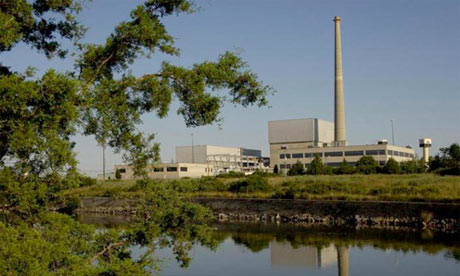As of 11 p.m. Tuesday, the ban — Ballot Question 300 — was leading 16,798 votes to 11,544 and had widened its margin of victory with every report, according to the Boulder and Weld county clerk's offices. That gave ban supporters about 59 percent of the vote.
“Are you kidding?” screamed ban supporter Teresa Foster as results came in to a watch party held by Our Health, Our Future, Our Longmont. “Awesome! Yeah! Yeah! Yeah!”
Ballot Question 300: Longmont fracking ban storms to victory
Hurricane Sandy’s Unmistakable Message
 While politicians play for votes and ignore the evidence of a rapidly changing climate, Mother Nature has made the consequences heartbreakingly clear.
While politicians play for votes and ignore the evidence of a rapidly changing climate, Mother Nature has made the consequences heartbreakingly clear.
Four days after 24-year old Jake Vogelman was killed by a hurricane-toppled tree, NYPD detectives came to his house with his personal effects: a black leather wallet still wet from the rain and a watch that was still working
Removing the green cloak from natural gas
For decades, natural gas (methane) has been touted as a greener energy alternative to coal, when, according to a new Cornell University study, in considering its whole lifecycle, natural gas appears to be worse for climate change than the coal industry and is more toxic to the environment and human health.
The driver of gas' green halo is true: methane burns cleaner than coal, thus contributing less to global warming during combustion. However, the hydraulic fracturing process — the only way industry knows to get the gas that's left — releases significant amounts of methane, unburned, directly into the atmosphere. When methane isn't burned, it's 20 times more potent a greenhouse gas than carbon dioxide. Combine that with the 1,000 truck trips, on average, 2 million to 8 million gallons of water, and 10,000 to 40,000 gallons of chemicals used per well.
Breast Cancer Action: Why Fracking Must Be Banned
 The United States, as it turns out, has a lot of unburned natural gas trapped as tiny bubbles in our shale bedrock. Until about a decade ago, much of this trapped underground gas was considered unrecoverable. But that all changed with the rollout of a drilling technique (pioneered by Halliburton) called hydrofracturing, or fracking.
The United States, as it turns out, has a lot of unburned natural gas trapped as tiny bubbles in our shale bedrock. Until about a decade ago, much of this trapped underground gas was considered unrecoverable. But that all changed with the rollout of a drilling technique (pioneered by Halliburton) called hydrofracturing, or fracking.
Fracking bores horizontally through the bedrock, blasts it with explosives, and forces into the cracks, under enormous pressure, millions of gallons of water laced with a proprietary mix of poisonous chemicals that further fracture the rock. These boreholes provide the channel out of which the gas flows.
Here’s how hydraulic fracturing introduces cancer risks into communities from the start and into perpetuity:
America's nuclear safety under scrutiny after Oyster Creek's Sandy alert
 We know the bad news about superstorm Sandy: the Jersey shore was devastated and many towns remain waterlogged. New York suffered a direct hit, with the city's mass transit system flooded and part-paralyzed for days to come.
We know the bad news about superstorm Sandy: the Jersey shore was devastated and many towns remain waterlogged. New York suffered a direct hit, with the city's mass transit system flooded and part-paralyzed for days to come.
But there is good news, too, and that is all that it failed to do. Sandy did not kill hundreds – as Hurricane Katrina did in New Orleans in 2005 – thanks, in part, to timely evacuations and rescue efforts. And luckily, it did not trigger an even greater disaster at one of the region's nuclear power plants. But it could have.
A Dairy Farmer Shares Her Story About Fracking: “What Have We Done?”
 In the early spring of 2006, a nice man was in the area, promoting a chance to dream of better times for Bradford County and its farmers. There was promise of jobs for everyone and the farmer would generate money from signing a lease, and if a gas well was drilled on the farmer’s property he would become rich.
In the early spring of 2006, a nice man was in the area, promoting a chance to dream of better times for Bradford County and its farmers. There was promise of jobs for everyone and the farmer would generate money from signing a lease, and if a gas well was drilled on the farmer’s property he would become rich.
Two years passed with little activity. By now, the older leases were about to expire, gas companies were beginning to drill, and excitement was in the air. Here, the majority of farmers signed early, receiving $5- $85/per acre. There was this belief that the person with the gas well would become the next “shaleionaires.” We later found out small acre properties started signing leases at $2,500/ per acre.
It's Global Warming, Stupid
 Yes, yes, it’s unsophisticated to blame any given storm on climate change. Men and women in white lab coats tell us—and they’re right—that many factors contribute to each severe weather episode. Climate deniers exploit scientific complexity to avoid any discussion at all.
Yes, yes, it’s unsophisticated to blame any given storm on climate change. Men and women in white lab coats tell us—and they’re right—that many factors contribute to each severe weather episode. Climate deniers exploit scientific complexity to avoid any discussion at all.
Clarity, however, is not beyond reach. Hurricane Sandy demands it: At least 40 U.S. deaths. Economic losses expected to climb as high as $50 billion. Eight million homes without power. Hundreds of thousands of people evacuated. More than 15,000 flights grounded. Factories, stores, and hospitals shut. Lower Manhattan dark, silent, and underwater.
More Articles...
Page 87 of 201

 Environmental Glance
Environmental Glance






























